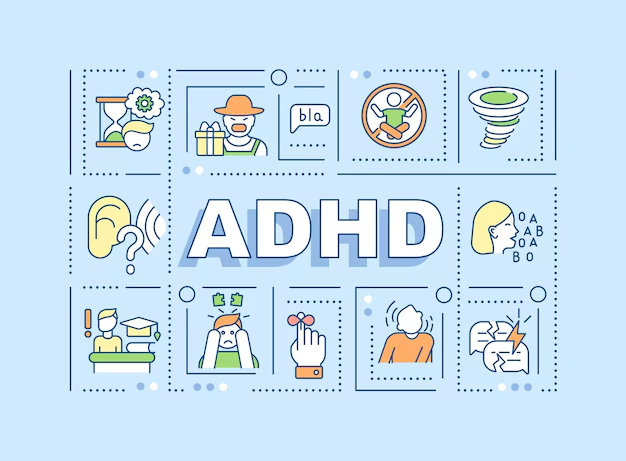Attention Deficit Hyperactivity Disorder (ADHD) is often perceived as a childhood condition, but it persists into adulthood for many individuals. Adult ADHD can significantly impact various aspects of life, including professional and personal relationships, daily functioning, and overall mental health. In the UK, USA, and Canada, awareness and diagnosis of adult ADHD are increasing, leading to more people seeking treatment and support. This essay explores the challenges of managing ADHD in adults and discusses various strategies and resources available in these three countries.
Understanding ADHD in Adults
ADHD is a neurodevelopmental disorder characterized by symptoms of inattention, hyperactivity, and impulsivity. While these symptoms are commonly associated with children, they can persist into adulthood and manifest differently. Adults with ADHD may experience difficulties in organizing tasks, managing time, maintaining focus, and controlling impulses. These challenges can lead to issues in the workplace, strained relationships, and low self-esteem.
Symptoms of Adult ADHD
The symptoms of ADHD in adults can be categorized into two main types: inattention and hyperactivity-impulsivity.
Inattention:
- Difficulty sustaining attention in tasks or activities
- Frequent careless mistakes in work or other activities
- Difficulty organizing tasks and activities
- Often losing things necessary for tasks and activities
- Easily distracted by extraneous stimuli
- Forgetfulness in daily activities
Hyperactivity-Impulsivity:
- Fidgeting or tapping hands or feet
- Inability to stay seated in situations where it is expected
- Feeling restless and unable to relax quietly
- Excessive talking
- Difficulty waiting for one’s turn
- Interrupting or intruding on others
Prevalence of Adult ADHD in the UK, USA, and Canada
United Kingdom
In the UK, it is estimated that about 2.5% of adults have ADHD. Awareness and diagnosis of the condition in adults have been growing, although there is still a significant gap in understanding and recognition. The National Institute for Health and Care Excellence (NICE) provides guidelines for the diagnosis and management of ADHD, emphasizing the importance of a comprehensive assessment and multimodal treatment approach.
United States
In the USA, adult ADHD affects approximately 4.4% of the population. The American Psychiatric Association (APA) and the Centers for Disease Control and Prevention (CDC) recognize ADHD as a chronic condition that can persist into adulthood. There has been a notable increase in awareness, leading to more adults being diagnosed and seeking treatment. The Adult ADHD Self-Report Scale (ASRS) is a commonly used tool for screening and diagnosis.
Canada
In Canada, the prevalence of adult ADHD is similar to that in the USA, with around 4% of adults affected. The Canadian ADHD Resource Alliance (CADDRA) provides guidelines and resources for the diagnosis and management of ADHD in both children and adults. There is a growing recognition of the impact of adult ADHD on mental health and functioning, leading to more comprehensive treatment options.
Challenges of Managing ADHD in Adults
Managing ADHD in adults presents several unique challenges, including difficulties in diagnosis, co-occurring conditions, and the need for tailored treatment approaches.
Diagnosis
Diagnosing ADHD in adults can be challenging because symptoms often overlap with other mental health conditions, such as anxiety, depression, and bipolar disorder. Additionally, adults may have developed coping strategies that mask their symptoms, making it harder to recognize the disorder. A thorough assessment by a healthcare professional, including a detailed history and evaluation of current symptoms, is essential for an accurate diagnosis.
Co-occurring Conditions
Adults with ADHD often have co-occurring mental health conditions, such as anxiety, depression, substance use disorders, and learning disabilities. These comorbidities can complicate the diagnosis and treatment of ADHD, requiring a comprehensive and integrated approach to address all aspects of an individual’s mental health.
Stigma and Misunderstanding
Despite growing awareness, there is still significant stigma and misunderstanding surrounding ADHD in adults. Many people mistakenly believe that ADHD is a condition that only affects children or that it results from poor parenting or lack of discipline. This stigma can prevent adults from seeking help and can impact their self-esteem and mental health.
Treatment and Management Strategies
Managing ADHD in adults typically involves a combination of medication, psychotherapy, lifestyle changes, and support systems. A multimodal approach tailored to the individual’s needs is often the most effective.
Medication
Medications are a cornerstone of ADHD treatment and can significantly reduce symptoms of inattention, hyperactivity, and impulsivity. The most commonly prescribed medications for adult ADHD include stimulants and non-stimulants.
Stimulants: These medications, such as methylphenidate (Ritalin) and amphetamines (Adderall), are the most effective for reducing ADHD symptoms. They work by increasing the levels of certain neurotransmitters in the brain that regulate attention and behavior.
Non-Stimulants: Non-stimulant medications, such as atomoxetine (Strattera) and guanfacine (Intuniv), are also used to treat ADHD. They may be preferred for individuals who do not respond well to stimulants or have a history of substance abuse.
Psychotherapy
Psychotherapy, particularly cognitive-behavioral therapy (CBT), is an important component of ADHD treatment for adults. CBT can help individuals develop skills to manage their symptoms, improve organizational and time management abilities, and address negative thought patterns that may contribute to low self-esteem or anxiety.
Mindfulness-Based Interventions: Mindfulness practices can also be beneficial for adults with ADHD. Techniques such as meditation and mindfulness-based stress reduction can help individuals improve focus, reduce impulsivity, and manage stress.
Lifestyle Changes
Making certain lifestyle changes can have a positive impact on managing ADHD symptoms. These changes include:
Regular Exercise: Physical activity has been shown to improve attention, executive functioning, and mood in individuals with ADHD.
Healthy Diet: A balanced diet rich in fruits, vegetables, whole grains, and lean proteins can support overall brain health and reduce symptoms.
Sleep Hygiene: Establishing a regular sleep routine and ensuring adequate rest is crucial, as sleep problems are common in adults with ADHD and can exacerbate symptoms.
Support Systems
Building a strong support system is essential for managing ADHD in adults. This can include:
Professional Support: Regular follow-ups with healthcare providers, including psychiatrists, psychologists, and therapists, can help monitor progress and adjust treatment plans as needed.
Peer Support Groups: Joining support groups for adults with ADHD can provide a sense of community and shared experience. These groups can offer practical advice, emotional support, and coping strategies.
Family and Friends: Educating family members and close friends about ADHD can help them provide better support and understanding. Open communication about challenges and needs can strengthen relationships and reduce misunderstandings.
ADHD in the UK
In the UK, the management of adult ADHD is guided by the NICE guidelines, which recommend a comprehensive assessment and a combination of medication and psychological interventions. The NHS provides access to ADHD services, but there are often long waiting times for diagnosis and treatment. Private healthcare options are available for those who can afford them, providing quicker access to assessments and interventions.
The ADHD Foundation and other advocacy groups work to raise awareness and provide resources and support for individuals with ADHD and their families. These organizations also advocate for better services and support within the healthcare system.
ADHD in the USA
In the USA, the management of adult ADHD is supported by guidelines from the APA and other professional organizations. There is a wide range of treatment options available, including medication, therapy, and lifestyle interventions. However, access to care can vary depending on insurance coverage and geographic location.
Organizations such as CHADD (Children and Adults with Attention-Deficit/Hyperactivity Disorder) provide resources, support, and advocacy for individuals with ADHD. CHADD offers educational programs, support groups, and information on the latest research and treatment options.
ADHD in Canada
In Canada, the CADDRA guidelines provide comprehensive recommendations for the diagnosis and management of ADHD in adults. Publicly funded healthcare services offer access to medication, therapy, and support, although there can be variability in access and quality of care across different provinces and territories.
The Centre for ADHD Awareness, Canada (CADDAC) and other advocacy organizations provide resources, support, and education for individuals with ADHD and their families. These organizations work to improve awareness, reduce stigma, and advocate for better services and support within the healthcare system.
Conclusion
Managing ADHD in adults requires a comprehensive and individualized approach that includes medication, psychotherapy, lifestyle changes, and support systems. In the UK, USA, and Canada, there are growing efforts to improve awareness, diagnosis, and treatment of adult ADHD. Despite the challenges, with the right strategies and support, individuals with ADHD can lead fulfilling and productive lives. Continued advocacy and education are essential to reduce stigma and ensure that all individuals with ADHD have access to the care and resources they need.




